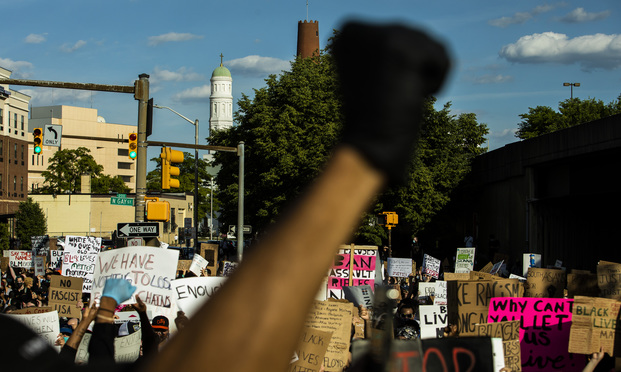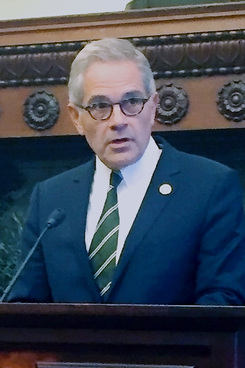One Size Does Not Fit All: Phila. DA, Defense Lawyers Eye New Approaches to Arrests in Wake of Protests
Each charging decision, Philadelphia District Attorney Larry Krasner said, will be handled on a case-by-case basis, and his office will not look to "crush with big and unsustainable charges." He said his office is aiming to focus prosecution resources on looters.
June 04, 2020 at 06:08 PM
7 minute read
 Thousands march in Baltimore protesting police brutality and the killing of George Floyd in Minnesota at the hands of local police June 1, 2020. Photo: Diego M. Radzinschi/ALM
Thousands march in Baltimore protesting police brutality and the killing of George Floyd in Minnesota at the hands of local police June 1, 2020. Photo: Diego M. Radzinschi/ALM
With a surge of nearly 700 criminal cases opened in less than a week since the advent of protests in Philadelphia sparked by the death of George Floyd, District Attorney Larry Krasner and a recently assembled collective of defense attorneys say these cases are going to be handled differently than they've been in the past during periods of large-scale unrest.
Krasner said his office is aiming to focus prosecutions on looters, and is rapidly poring over written and cellphone evidence in an effort to bring cases only when charges are warranted. Each charging decision, Krasner said, will be handled on a case-by-case basis, and his office will not look to "crush with big and unsustainable charges."
Citing an instance from the 2000 Republican National Convention where a man accused of leading street protests was hit with $1 million bail, Krasner said his office will not seek to overcharge but will focus resources on bringing sustainable charges.
"We're not fans of one size fits all. It's a lot of work," Krasner said. "It's easy to have [broad] policies, but you've got to be willing to look at the evidence in each case. It's a big deal to waste taxpayer money, the court's time, and to put someone through the ringer."
On the other side of the looming court battles, a group of lawyers through the legal collective Up Against the Law have offered to represent those charged during the unrest pro bono. According to the group's leaders, about 20 lawyers have joined, and so far they have been sifting through the hundreds of cases that have been filed,
Following a press conference Thursday attended by attorneys Paul Hetznecker, Michael Coard, Marni Jo Snyder and Kevin Mincey, Hetznecker said that, although he has represented protesters for decades—including during the RNC and the Occupy movement—when it comes to handling these cases it's "not really dusting off a playbook."
The broader context of the protests "changes the dialogue, and that will be part of the effort that we as voluntary lawyers bring to bear," Hetznecker said. "We bring the experience we all have as criminal defense attorneys, but we also bring our sense of social justice and social conscience about how [the cases] should be characterized and the framework, the broader framework, they are presented both in and out of court."
For many the cases are also more personal.
"Occupy was, I felt these people had their First Amendment rights and that was important, but this is First Amendment rights and the fight for the rights of black people and obviously that's one of the reasons why this is deeply, deeply important to me," Mincey said. "I'm hopeful that the momentum people have generated will continue to roll."
Sparked in large part by the recent deaths of George Floyd, Breonna Taylor and Ahmaud Arbery, the first scheduled protests in Philadelphia took place May 30 to decry police brutality. After clashes with police, days of protests have followed, with thousands marching peacefully. However, widespread looting also broke out in Center City, West Philadelphia and elsewhere.
 Philadelphia District Attorney Larry Krasner. Photo: P.J. D'Annunzio/ALM
Philadelphia District Attorney Larry Krasner. Photo: P.J. D'Annunzio/ALMAccording to Krasner, although cases are continuing to come in, his office has so far brought 691 cases against a total of 672 defendants. He estimated that 70% of those do not stem from peaceful protests, but stem from "opportunistic" looting.
A variety of charges have been brought, he said, including many for burglary. Assault charges have also been brought, and, in a small number of instances, he said, charges not usually connected with demonstrating or looting, such as carrying a gun with a prior felony, have also been charged.
Court records show bail has been set in some cases at between $5,000 and $20,000. According to Krasner one of the highest bails set was $200,000, which, he said, involved a white man with a prior conviction for ethnic intimidating who had been carrying a gun. He also noted that bail is not set by his office, but by bail commissioners.
The office did not immediately give specifics on how many of those charged have been held on bail, but said most people without prior arrests who've been charged with nonviolent offenses have been released without bail and the jail population has seen only a slight increase.
Krasner also said about 75% of the people arrested since May 30 have been from Philadelphia, and more than 40%, he said, have had no prior arrests. Those without prior convictions, he said, is well over half.
One category his office has not brought many charges against, he said, is juveniles. According to Krasner, that is because federal law mandates that juveniles be arraigned within six hours, but in some instances his office, he said, did not get the necessary paperwork until as many as 17 hours later. However, he said his office can still bring charges against those individuals at a later date.
With police officers often working double shifts, there have been challenges when it comes to gathering evidence, but Krasner said his office has been working well with police to overcome those hurdles.
"There are challenges, but the police department and our office are working really hard to get around it," he said, giving the example of calling officers directly when they have not yet had time to give written statements.
Otherwise, he said, prosecutors are poring over police statements and often copious cellphone footage, as well as taking complaints from their hotline and speaking with witnesses so the charges that are brought can hold up in court.
During Up Against the Law's press conference Thursday attorneys and speakers reported excessive force by officers and instances where people were picked up by police and detained as they walked to and from work. In that respect, attorneys said cases stemming from the current unrest may be different from previous protests, where the events were isolated. The ongoing COVID-19 pandemic also complicates issues.
Snyder said during the event that, even though many arrested were given citations, that could still have constitutional implications.
"Their freedoms were taken for a period of time. Some were brutalized by police, and moved to other locations. They were not properly given PPE, they were not social distancing and they were held for many hours," she said. "Those people were not just handed a citation on the street."
One other instance where these cases may be different is that, before being elected as district attorney, Krasner was well known for representing protesters, and worked alongside many of the lawyers now defending these cases. Needless to say, he will not be part of the defense effort this time around.
But, attorneys with Up Against the Law said they don't expect his working as the city's top law enforcement officer to affect their adversarial roles either.
"I think that he is a principled individual and he will approach this in a principled manner. But that doesn't mean we we're not going to have significant political policy and legal disagreements over these cases," Hetznecker said. "I anticipate it."
This content has been archived. It is available through our partners, LexisNexis® and Bloomberg Law.
To view this content, please continue to their sites.
Not a Lexis Subscriber?
Subscribe Now
Not a Bloomberg Law Subscriber?
Subscribe Now
NOT FOR REPRINT
© 2025 ALM Global, LLC, All Rights Reserved. Request academic re-use from www.copyright.com. All other uses, submit a request to [email protected]. For more information visit Asset & Logo Licensing.
You Might Like
View All
High Court Revives Kleinbard's Bid to Collect $70K in Legal Fees From Lancaster DA
4 minute read
Judges Push for Action to Combat Increasing Threats Against Judiciary
3 minute read
Dispute Over Failure to Accommodate Disability Ends in $900K Settlement
3 minute read
Pa. Federal District Courts Reach Full Complement Following Latest Confirmation
Trending Stories
- 1Miami-Dade Litigation Over $1.7 Million Brazilian Sugar Deal Faces Turning Point
- 2Trump Ordered by UK Court to Pay Legal Bill Within 28 Days
- 3$19.1M Verdict: 'Most Accurate Settlement Demand I Ever Made'
- 4Grassley Picks Former GOP Policy Committee Attorney to Be Chief Nominations Counsel
- 5Insurers in Crosshairs After Police-Brutality Judgment
Who Got The Work
J. Brugh Lower of Gibbons has entered an appearance for industrial equipment supplier Devco Corporation in a pending trademark infringement lawsuit. The suit, accusing the defendant of selling knock-off Graco products, was filed Dec. 18 in New Jersey District Court by Rivkin Radler on behalf of Graco Inc. and Graco Minnesota. The case, assigned to U.S. District Judge Zahid N. Quraishi, is 3:24-cv-11294, Graco Inc. et al v. Devco Corporation.
Who Got The Work
Rebecca Maller-Stein and Kent A. Yalowitz of Arnold & Porter Kaye Scholer have entered their appearances for Hanaco Venture Capital and its executives, Lior Prosor and David Frankel, in a pending securities lawsuit. The action, filed on Dec. 24 in New York Southern District Court by Zell, Aron & Co. on behalf of Goldeneye Advisors, accuses the defendants of negligently and fraudulently managing the plaintiff's $1 million investment. The case, assigned to U.S. District Judge Vernon S. Broderick, is 1:24-cv-09918, Goldeneye Advisors, LLC v. Hanaco Venture Capital, Ltd. et al.
Who Got The Work
Attorneys from A&O Shearman has stepped in as defense counsel for Toronto-Dominion Bank and other defendants in a pending securities class action. The suit, filed Dec. 11 in New York Southern District Court by Bleichmar Fonti & Auld, accuses the defendants of concealing the bank's 'pervasive' deficiencies in regards to its compliance with the Bank Secrecy Act and the quality of its anti-money laundering controls. The case, assigned to U.S. District Judge Arun Subramanian, is 1:24-cv-09445, Gonzalez v. The Toronto-Dominion Bank et al.
Who Got The Work
Crown Castle International, a Pennsylvania company providing shared communications infrastructure, has turned to Luke D. Wolf of Gordon Rees Scully Mansukhani to fend off a pending breach-of-contract lawsuit. The court action, filed Nov. 25 in Michigan Eastern District Court by Hooper Hathaway PC on behalf of The Town Residences LLC, accuses Crown Castle of failing to transfer approximately $30,000 in utility payments from T-Mobile in breach of a roof-top lease and assignment agreement. The case, assigned to U.S. District Judge Susan K. Declercq, is 2:24-cv-13131, The Town Residences LLC v. T-Mobile US, Inc. et al.
Who Got The Work
Wilfred P. Coronato and Daniel M. Schwartz of McCarter & English have stepped in as defense counsel to Electrolux Home Products Inc. in a pending product liability lawsuit. The court action, filed Nov. 26 in New York Eastern District Court by Poulos Lopiccolo PC and Nagel Rice LLP on behalf of David Stern, alleges that the defendant's refrigerators’ drawers and shelving repeatedly break and fall apart within months after purchase. The case, assigned to U.S. District Judge Joan M. Azrack, is 2:24-cv-08204, Stern v. Electrolux Home Products, Inc.
Featured Firms
Law Offices of Gary Martin Hays & Associates, P.C.
(470) 294-1674
Law Offices of Mark E. Salomone
(857) 444-6468
Smith & Hassler
(713) 739-1250





